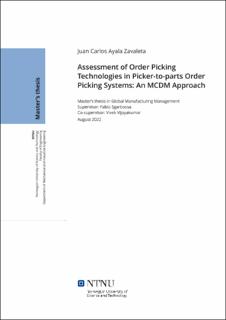| dc.description.abstract | This thesis evaluates the available order picking technologies and their level of automation based on performance criteria in picker-to-parts order picking systems. To evaluate these technologies a group MCDM approach was used to include experts knowledge and to deliver a ranked list.
The research was guided and based through research questions:
1) What are the main performance criteria of the order picking system in a picker-to-parts warehouse?
2) What are the most suitable order picking technologies for a warehouse that operates with a picker-to-parts method?
3) What should managers be aware when implementing an order-picking technology in a warehouse?
The research methodology of the present thesis is based in a combination of literature reviews, MCDM through group AHP and a sensitivity analysis of the results. The literature study was performed to find the performance criteria in a picker-to-parts OP system and to find the order picking technologies available. The MCDM was performed with a panel of operational experts from different countries and industries with experience in order picking, and an academic expert in warehousing and logistics using the criteria and technologies found in the literature studies.
Little literature in multi-criteria decision-making was found in the field of order-picking, thus the relevance of this study and the value it provides to both the academy, and the industry is based in the support for taking decisions backed up in relevant data when assessing OP technologies in a picker-to-parts OPS. A holistic approach, considering economic performance, quality, and wellbeing of the operators was considered to assess the different technologies. Furthermore, three different system settings, independent from industry or type of warehouse, were defined and analyzed with the aim to find the most suitable OP technology for each scenario. Results show that technologies with a higher level of automation are preferred over manual solutions because they provide better quality and wellbeing, however DMs have a strong preference for considering the economic performance of the OP system, where manual technologies score better. Future research should focus in using fuzzy theory to account for uncertainty, and comparing more combinations of different technologies in the same analysis.
Keywords: MCDM, order picking, picker-to-parts, warehouse, group AHP. | |
